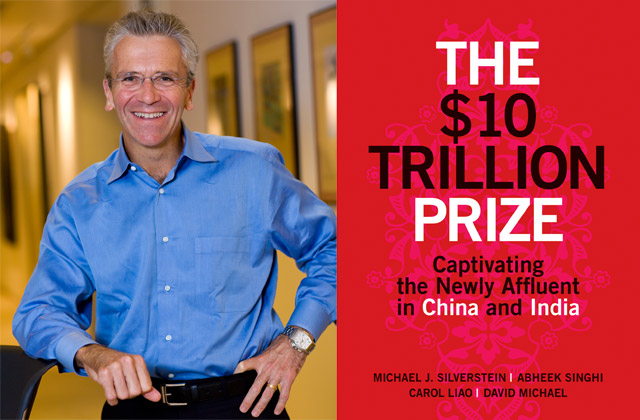Book Excerpt: How You Can Tap China and India's $10 Trillion Consumer Markets

This Tuesday, October 2 at Asia Society New York, Michael J. Silverstein, leader of The Boston Consulting Group's global Consumer practice, will speak with Aparisim "Bobby" Ghosh, TIME's Editor-at-Large, about the group's The $10 Trillion Prize: Captivating the Newly Affluent in China and India. Click here for complete details of the program, which also includes a lunch.
(For those who can't attend in person, meanwhile, the event will also be a free live video webcast on AsiaSociety.org/Live at 12:30 pm ET; online viewers are encouraged to submit questions to [email protected].)
Read an excerpt from The $10 Trillion Prize below, followed by a video trailer for the book.
The economic miracles of China and India, spurred by fundamental reforms begun two decades ago, have now driven a boom of productivity gains that will remain strong and even strengthen in the future. By 2029, if not sooner, China will have surpassed the United States as the world's largest economy. By 2028, India will likely have surged past Germany and Japan, establishing itself as the world's third-largest economy.
China's productivity growth rate is forecast to be particularly strong in the current decade as its workforce gains experience, and growth tapers only moderately after 2020. India's productivity growth has been more sluggish and starts from a lower base, but it is predicted to grow strongly in the next three decades, as education and infrastructure improve, urbanization accelerates, and an abundance of young and energetic citizens enters the workforce.
Productivity is important because it strongly correlates with the growth of personal incomes — which, in turn, will fuel the consumer revolution. The increased consumption that results is proportional — we have coined it the $10 trillion prize.
We calculate that between 2010 and 2020, the people of China and India will consume goods and services worth a total of $64 trillion. Chinese consumers will spend $41.5 trillion over this period, with annual expenditures rising from $2.0 trillion to $6.2 trillion, an increase of 203 percent. Indians will spend $22.5 trillion, with their annual expenditures rising from $991 billion to $3.6 trillion, an astonishing 261 percent increase.
In other words, Chinese and Indian consumers will be spending nearly $10 trillion a year by 2020 — more than three times the amount they are spending today. Their combined share of the global market will grow from 8.2 percent to 15.7 percent.
Of course, there is uncertainty in any forecast of the future — forecasts presume stability, and in the real world, they can be knocked off course by economic downturns, natural disaster, political instability, and corruption. The road to the $10 trillion prize could potentially be a rocky one.
Nevertheless, for Chinese children born in 2009, continued economic progress will probably mean that over the course of their lives, they can expect to consume thirty-eight times more material goods than their grandparents. Life expectancy has grown from forty-seven years for a Chinese baby born in 1960 to seventy-three years for one born in 2009. An Indian baby born in 2009 can expect to live to the age of sixty-four — twenty-two years longer than its grandparents — and consume thirteen times more material goods than its grandparents, too. In comparison, a child born in the United States in 2009, although likely to enjoy the world's highest standard of living, might consume only twice as much as his or her grandparents and live only nine years longer.
The big reason for this growth in the standard of living in China and India, which will put enormous pressure on global supply, is rising incomes. From 2010 to 2020, annual per-capita incomes will increase, on average, from about $4,400 to $12,300 in China and from $1,500 to $4,400 in India. As a result, China's upper class will grow from 24 million to 91 million households, the middle class will grow from 109 million to 202 million households, and the lower class will shrink from 260 million down to 138 million households (figure 1-8). The number of people living on less than $1.25 a day — the international poverty line — will fall from 208 million to 150 million. India's upper class will rise from 9 million to 32 million households, the middle class will jump from 63 million to 117 million households, and the lower class will decline from 152 million to 110 million households. The number of people below the poverty line will fall from 455 million to under 200 million.
Reprinted by permission of Harvard Business Review Press. Excerpted from The $10 Trillion Prize: Captivating the Newly Affluent in China and India by Michael J. Silverstein, Abheek Singhi, Carol Liao, and David Michael. Copyright 2012 Boston Consulting Group, Inc.
Watch the trailer:

